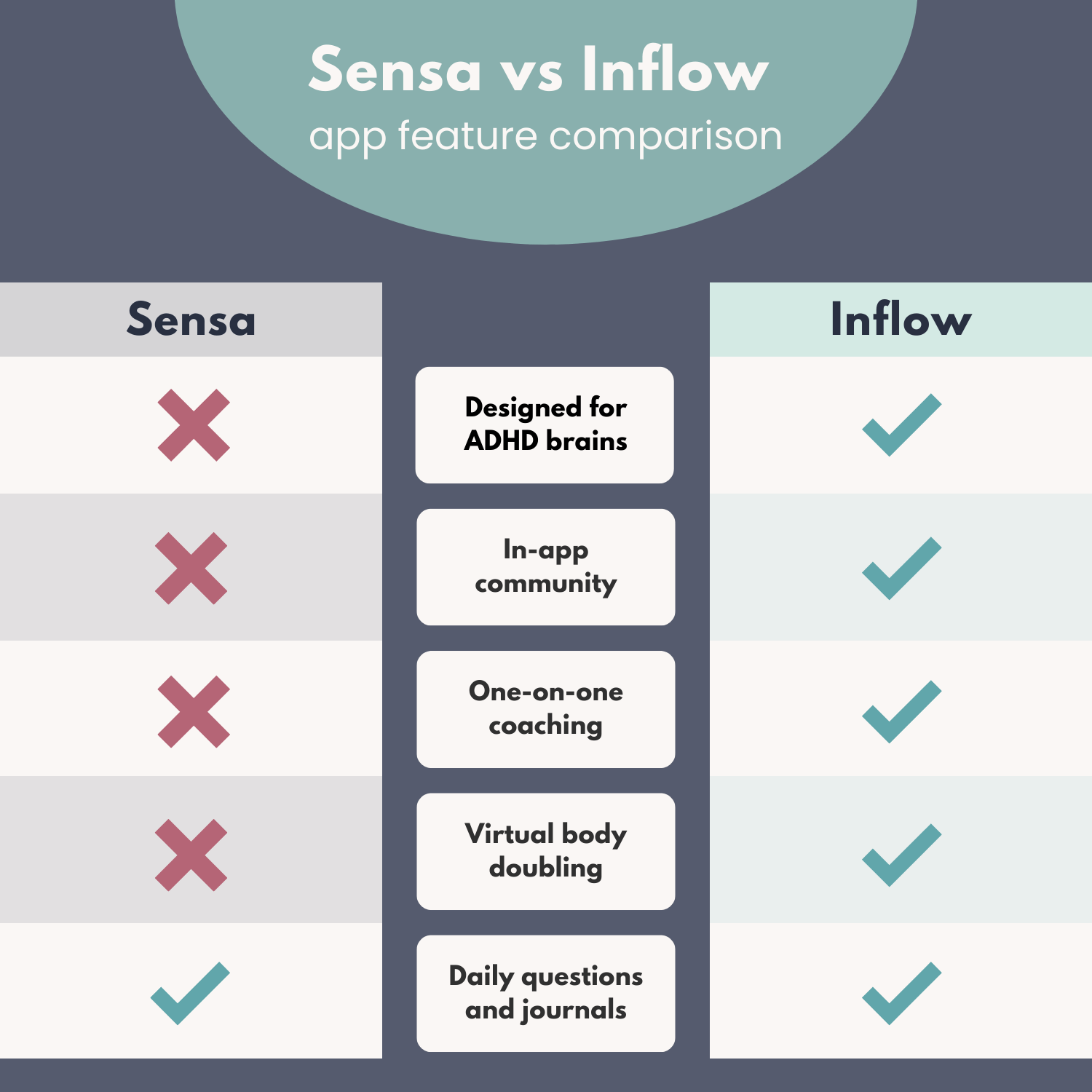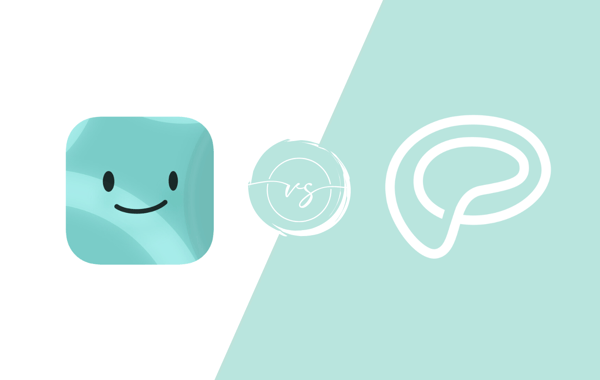In today's fast-paced world, managing mental health effectively can be challenging, particularly for adults struggling with ADHD.
Fortunately, technology has provided valuable tools to support our mental well-being. Among the most popular platforms for mental health management and self-improvement are Inflow and Sensa.
But which one is better for people with ADHD?
This article will delve into these two platforms, providing a thorough analysis to help you decide based on your unique needs and preferences.
Inflow vs. Sensa: Comparing apps and features

Overall purpose
📣 It's important to note that while Inflow and Sensa are based on cognitive behavioral therapy (CBT) techniques, they are not substitutes for traditional therapy or medication management. They are supplementary tools to help users gain insights and develop effective coping strategies.
Inflow’s mission
Inflow tackles the unique challenges of managing ADHD head-on, offering effective and practical tools and tips, personalized ADHD coaching, and a supportive member community full of like-minded people.
Through self-paced lessons, private accountability coaches who work with users on their goals, and useful "brain hacks" and "key takeaways," the Inflow app provides a comprehensive learning resource for adults with ADHD to proactively manage their symptoms in different areas of life, including relationships, parenting, school, and work.
Sensa’s mission
Sensa's method focuses on observing users' mental health behavior, recommending specific actions and exercises, and checking for improvements. The app offers activities to manage stress, anxiety, and other mental health concerns.
Sensa provides programs that consider the users' unique triggers after completing a quiz. These programs typically contain text-based activity suggestions like meditation, breathing exercises, and mindfulness techniques.
Approach
Both apps are built on cognitive-behavioral therapy (CBT) principles.
Inflow’s approach
Inflow offers a wide range of daily bite-sized learning modules that address symptoms or experiences familiar to most ADHDers. Among the hundreds of audio lessons available are topics like:
- Procrastination
- Executive dysfunction
- Organization
- Emotion control
- ADHD burnout
- Rejection sensitive dysphoria
- Task avoidance
- Anxiety
Inflow's goal is to empower users by educating them about the impact of ADHD on their lives and equipping them with practical strategies to manage daily challenges related to ADHD.
Sensa’s approach
Sensa primarily focuses on providing information related to general psychology, general mental health conditions, and CBT topics, such as:
- Post-traumatic stress disorder (PTSD)
- Depression
- ADHD
- Fatigue
- Stress
- Anxiety
- Self-esteem
Sensa emphasizes anxiety and stress management through learning plans and grounding techniques.
Target audience and ideal users
Who is Inflow for?
Inflow is specifically designed for adults and older adolescents with ADHD, whether diagnosed, self-diagnosed, or undiagnosed.
Ideal users of Inflow include:
- ADHD adults seeking structured guidance and information about ADHD
- Those wanting to learn more about how ADHD symptoms affect various aspects of their life
- ADHDers looking to improve their symptoms and meet their full potential
- People looking for accountability and motivation
Inflow is not suitable for people who are:
- Seeking prescription medication
- Seeking therapy
- Children
- Seeking help for other mental health conditions unrelated to ADHD
Who is Sensa for?
Sensa mainly targets people with mild anxiety, acute stress, or depression. However, it also has plans targeting things like ADHD and autism.
Ideal users of Sensa include:
- People dealing with stress, anxiety, and/or depression
- Anyone seeking self-improvement
- People who prefer learning through text only
Sensa is not suitable for people who are:
- Seeking prescription medication
- Seeking therapy
- Children
- Seeking in-depth information specific to ADHD
In-app content
Both Inflow and Sensa have content focused on practical tools, strategies, and insights to help folks manage their mental health and enhance overall well-being.
Inflow’s content
- Short, self-paced, listenable lessons focused on ADHD-related subjects—time management, forgetfulness, etc.—and how they impact daily life
- Brain hacks and tips for managing focus, setting boundaries, and building healthy habits
- Insights into how lifestyle factors like sleep, exercise, and nutrition can affect ADHD symptoms and guidance on how to improve them
- Interactive community with other ADHDers where users are prompted with a daily question; users can like and reply to other user responses
- Focus rooms and body doubling sessions to help with accountability and productivity
- Progress check-ins to help users track the positive impact Inflow has had on their ADHD journey
- Guided reflections, journal prompts, and free-writing journaling (no prompts)
Sensa’s content
- Educational reading content on psychology topics, such as cognitive distortions and thought patterns
- Plans tailored to specific mental health issues, like stress, anxiety, ASD, and ADHD
- Activities guiding users through exercises to challenge negative thought patterns, manage stress, and promote relaxation
- Quick relief exercises for temporary stress reduction
- Short mood journaling to help users track their emotions over time and free-writing journaling (no prompts)
Content format
Inflow’s formatting
- (Before downloading the app) Onboarding quiz: provides users with an ADHD score; personalizes module “starter packs” before starting a trial
- 100+ daily learning modules: audio-based; (text) transcriptions; highlighted text to emphasize import concepts; multiple audio playback speed options
- Key takeaways: provided at the end of lessons; can be saved by users
- Journaling prompts: at the end of lessons; related to module topics as “guided reflections” to help users better understand how to apply what they’ve learned
- Free-write journaling: free-writing journals for users to write about anything
- Quizzes: available for some modules; test users’ knowledge of ADHD topics
- Daily questions: in the community tab; users answer questions and like and reply to others’ answers
- Virtual content: body doubling through coworking and focus sessions
- Video content: library of 100+ past live events and webinars
- Progress check-ins: periodic mini surveys; tracking improvements made using Inflow
Sensa’s formatting
- (Before downloading the app) Onboarding quiz: offered at the time of sign-up; determines “lesson plan” before purchasing a subscription
- Seven learning plans: learning plans targeting common mental health issues
- Daily lessons: text-heavy lessons; focused on CBT ideologies and techniques
- Free-write journaling: free-writing journals for users to write about anything
- Mood journaling: limited to 500 characters per entry
- Activities: guided activities; recommended to users based on triggers and specific mental health challenges
Community support
Inflow community
- In-app community and daily questions for users
- Personal accountability coaching for goal-setting and moral support
- One-on-one coaching (additional cost)
- Virtual co-working and body doubling
Sensa community
At this time, Sensa does does not have a community feature.
Don't just take our word for it! Experience it for yourself with Inflow's 7-day free trial. Join the ADHD app community with over 16,000 users and stay in control of your ADHD. Take our ADHD quiz to get started!
Price and affordability
As of September 2023, both apps are comparable in pricing, which can be over $100 annually.
Inflow pricing and discounts
- Various pricing options
- Free one-year subscriptions available through the affordability program
- Student discounts
- Subscriptions at a monthly or annual rate
- Additional telecoaching sessions are available for an extra fee
Sensa pricing and discounts
- Various pricing options
- Three subscription plans
- Various discount codes around the web (though the legitimacy of them is unknown)
Free trials
Inflow: Inflow offers a seven-day free trial with all member sign-ups.
Sensa: There is no free version or trial available for Sensa. (Note: there is, however, a version where new users can "pay just $1" for a short period of time before being charged the full price)
Refund policies
Inflow’s refund policy
Inflow has an ADHD-friendly refund policy.
During the free trial period, Inflow sends reminder emails about upcoming payments. And even if a user forgets to cancel their subscription, a refund is provided upon request as long as it’s within 28 days of purchase.
Sensa’s refund policy
Sensa follows a “no refund policy” unless the app is faulty.
In these cases, refunds can only be requested within 14 days of purchase, and all requests must include a detailed explanation and visual proof of a faulty product.
Which app should you download? 7 things to consider
Deciding between Inflow and Sensa can be overwhelming and lead to unnecessary decision paralysis. Here are some steps to help you make an informed decision:
1. Figure out what you want from an ADHD app.
Think about what matters most to you when managing your ADHD symptoms. Start by asking yourself what your specific needs and goals are:
- Are you looking for ADHD-specific apps or general mental health apps?
- Do you want to connect with other ADHDers?
- Do you want something created by people who also have ADHD?
- Are you looking for a trained professional to help you set goals, hold you accountable to them, and celebrate your wins?
- Do you want to track your mood progress?
- Do you want to track your ADHD symptom progress?
2. Read user reviews.
Take a look at user reviews for both apps. Hearing about other people's experiences can give you valuable insights into how each platform has helped individuals with ADHD.
💡 Pro tip! Look for reviews that mention usability, effectiveness, and overall user satisfaction.
🔑 Search for keywords like:
- “ADHD-friendly”
- “helpful”
- “life-changing”
- “customer service”
- “worth it”
3. Think about your learning preferences and style.
Some folks with ADHD might find certain formats more interesting and effective for their learning style, while others may be boring or hard to follow:
- Audio lessons or text lessons?
- Quizzes to match you with programs or quizzes to test your knowledge?
- General mood journaling or topic-specific journaling?
4. Try free trials.
Of the two apps, only Inflow offers a free trial.
Make the most of it and get a hands-on experience with its interface and content to see how well Inflow fits your needs.
5. Consult trustworthy professionals.
If possible, consult a mental health professional or therapist you trust who is knowledgeable about ADHD. They might provide insights or recommendations based on your specific needs and preferences.
6. Consider your budget.
Take a look at the pricing models and discounts available for both apps. Think about your budget and the value you're looking for from the features they offer.
Keep in mind that they have different pricing structures and that quality always comes with a cost.
7. Be open to change.
Lastly, remember that we’re all human: Our needs and preferences change over time!
If you give one app a shot and it doesn't quite meet your expectations, you can always switch to another or check out other options. (But keep their refund policies in mind!)
Final thoughts: Trust your gut
Ultimately, the choice between Inflow and Sensa is a personal decision. Both platforms have their strengths, and the best option for you depends on your needs, learning style, and goals in managing your ADHD symptoms.
Take your time to make an informed decision. We encourage you to reach out to each of their customer support teams if you have specific questions or concerns.
Best of luck with your decision!



.jpg)


